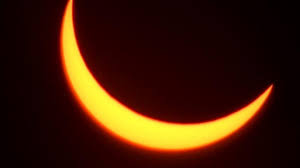The solar eclipse is a rare terrestrial phenomenon that attracts many curious minds across the world. Various types of spiritual beliefs and science surround the solar eclipse.
Spirituality
Solar eclipses have caused fear, inspired curiosity, and have been associated with myths, legends, and superstitions throughout history. Even today, an eclipse of the Sun is considered a bad omen in many cultures. So, here are a few superstitions in many countries, cultures and religions related to the solar eclipse.
In Vietnamese culture, people believe that a solar eclipse is caused due to a giant frog devouring the Sun.
In Norse culture, they blamed wolves for eating the Sun.
In ancient China, a celestial dragon was thought to lunch on the Sun, causing a solar eclipse. In fact, the Chinese word of an eclipse, “chih” or “shih”, means to eat.
In Hindu culture, the deity Rahu is beheaded by the gods for capturing and drinking Amrita, the gods' nectar. Rahu's head then flies off into the sky and swallows the Sun, causing an eclipse. It is this that most of us know as “Rahukalam”. Hence, many temples stop prayers and pujas during this period, as it is inauspicious.
Korean folklore suggests that solar eclipses happen because mythical dogs are trying to steal the Sun.
In Karnataka, as suggested by villagers, 3 children with special needs were buried neck-deep in sand to cure them of their deformities during the eclipse. This indicates the various superstitions prevailing across the world even today.
But not all superstitions surrounding the eclipse are about doom. In Italy, for example, it is believed that flowers planted during a solar eclipse are brighter and more colourful than flowers planted any other time of the year. A popular misconception is that solar eclipses can be a danger to pregnant women and their unborn children. In many cultures, young children and pregnant women are asked to stay indoors during a solar eclipse.
In many parts of India, people fast during a solar eclipse due to the belief that any food cooked or eaten while an eclipse happens will be poisonous and impure.
Science
A solar eclipse occurs when the moon or planet moves into the shadow of each other. When the Moon moves between the Sun and the Earth blocking the light of the Sun from reaching the Earth the phenomenon is called a solar eclipse. There are 3 types of solar eclipses:
Total solar eclipse: A Total solar eclipse is when the sky becomes very dark, as if it were night. For a Total solar eclipse to take place, the Sun, the Moon and the Earth must be in a straight line
Partial solar eclipse: A partial solar eclipse occurs when the Sun, Moon and Earth are not exactly in a straight line. The Sun appears to have a dark shadow on only a small part of its surface.
Annular solar eclipse: An annular eclipse occurs when the moon is farthest from Earth and hence seems smaller. During an annular eclipse, the moon is in front of the sun and looks like a dark disk on top of a larger sun-coloured disk. This makes it look as if there is a ring around the moon.
Solar eclipses usually happen every 18 months and lasts for a few minutes. Many of us have been told to not watch the solar eclipse with our naked eye. But, have you ever wondered why? After all, it’s just the Moon and the Sun. Well, exposing your eyes to the sun without proper eye protection during a solar eclipse can cause “Eclipse Blindness” or retinal burns, known as Solar Retinopathy. This exposure to the light can cause damage and even destroy cells in the retina that transmit what you see to the brain.
The solar eclipse happened on 26th December 2019 was last of the decade and various scientific institutions and government had made arrangements to view the total solar eclipse with special viewing equipment.
Religious beliefs and superstitions about the solar eclipse have no place in today’s world. But this wondrous spectacle fascinates people from all walks of life. For many children, it opens the doorway to science, especially to those interested in physics and astronomy.

